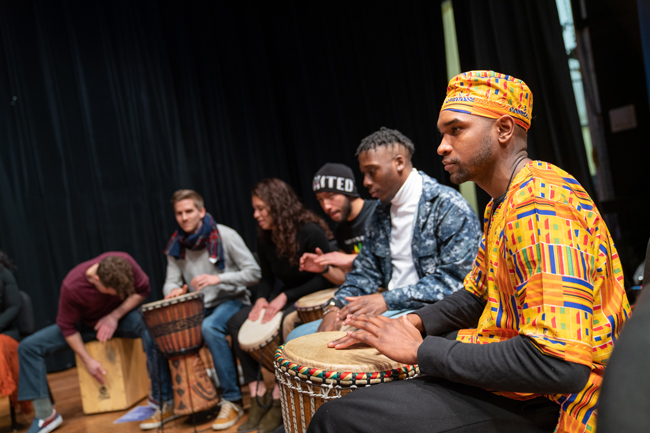In our STAR Level I and Level II trainings, we explore the impacts of trauma and resilience on body, brain, beliefs and behavior. We integrate many learning modalities, from embodied exercises to art-making to practice in compassionate listening. In this course we will dig deeply into embodied practices both for the individual practitioner’s well-being and resilience and for use in group facilitation to foster creativity and invite deep learning.
Drawing upon theory from conflict transformation, expressive arts, and trauma and resilience studies, participants will explore in the 5-day course: How do we cultivate possibility by developing new patterns? Can we live in both safety and vulnerability? How do we reckon with cycles and open to non-dualistic existence? How do we spark our own creativity and resilience engaging body, mind and spirit?
Activities (all optional) will include spoken word and drawing, breathing exercises, walking, stretching, dancing and playing games. We will emphasize the ethos of “low skill, high sensitivity” as we engage in play and arts-based exploration, “investigating new ways of moving, breathing, and engaging” (see Van der Kolk, below). Of course, high-skill folks are also welcome, but there is no requirement that participants have pre-conceived notions of themselves as “artists” to join the course.
A central theoretical underpinning to this course emerges from Bessel Van der Kolk’s introduction to Peter Levine’s latest book, Trauma and Memory (2015):
‘Negative judgment of oneself or others causes minds and bodies to tense up, which renders learning impossible. In order to recover, people need to feel free to explore and learn new ways to move. Only then can nervous systems reorganize themselves and new patterns be formed. This can only be done by investigating new ways of moving, breathing, and engaging, and cannot be accomplished by prescribing specific actions geared at “fixing.”’ (pages xv-xvi)
Instructors Katia Ornelas and Katie Mansfield are eager to engage with you in a week of playful, transformative and restorative practices, drawing on the full resources of body and mind. Katia is an attorney and artist who studied restorative justice during her MA at the CJP and is currently working on violence prevention programs in her native Mexico. Katie is Director of the STAR program and working toward a PhD in Expressive Arts and Conflict Transformation. Click here for an interview with them about the course and their experiences.
